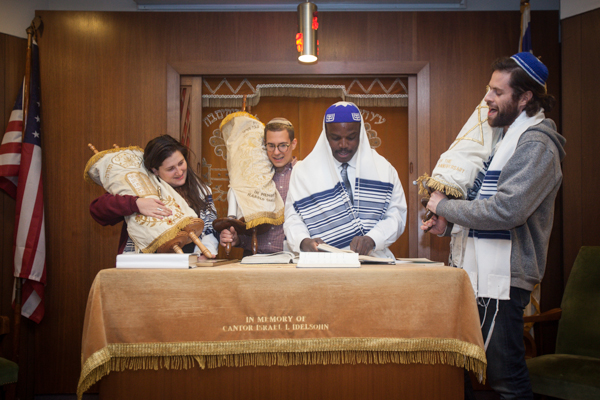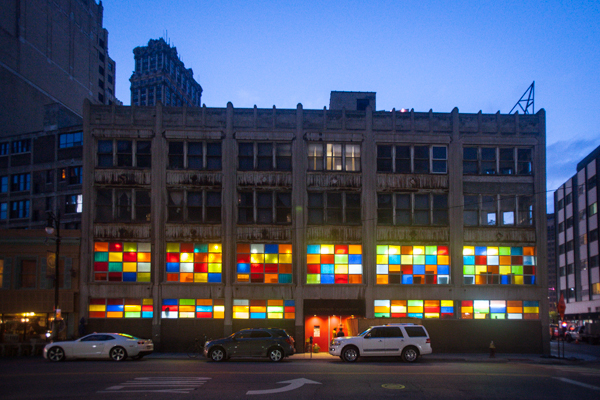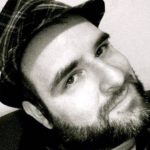Young, diverse, and full of moxie, Detroit’s Jewish community is making a comeback
Not long ago, speaking about a resurgent Jewish community in Detroit would have had folks thinking you were a few candles short of a full menorah. Today, however, that community is growing thanks to an influx of young people and a few key institutions.
Not long ago, speaking about a resurgent Jewish community in Detroit would have had folks thinking you were a few candles short of a full menorah. Since the late 2000s, though, there’s been a major revival of Jewish life in the city, spurred on by an enthusiastic influx of young Jews under the age of 40.
“The young Jewish community right now is vibrant,” says B’Daren “Ariel” Payne, a 25-year-old videographer who belongs to the Isaac Agree Downtown Synagogue (IADS). “There’s working stiffs. There’s artists. There’s rich layabouts. There’s philanthropists who live in the burbs but party in Detroit. There’s just a little bit of everybody, and it’s like Detroit is bringing them in like a moth to a flame.”
The Chabad of Greater Downtown Detroit estimates between 300 and 500 Jews currently live in the city, 500 (mostly commuters) go to college, and between 2,000 and 3,000 now spend their working hours downtown.
The recent resurgence hasn’t happened in a vacuum, however. It’s grown with the support of local institutions offering programs and space for people to meet, mingle, work, and pray together – places like the Downtown Synagogue, the Reconstructionist congregation that holds services in an Episcopalian church on East Jefferson, a Hillel of Metro Detroit office located at Wayne State, and the Chabad of Greater Downtown Detroit community center based in Brush Park.
The Isaac Agree Downtown Synagogue
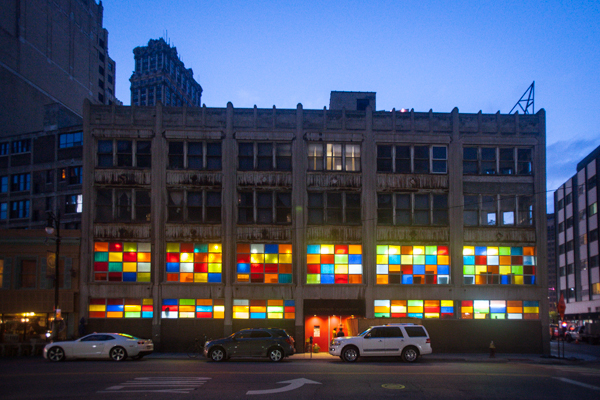
The Downtown Synagogue is probably the most well-known of Jewish institutions in the city of Detroit. In the last few years, it has grown from an institution that was near closing to a congregation of roughly 300 members. Besides services, IADS offers religious classes, sponsors discussions and holiday events, and carries out social justice work like tending a community garden with an east side block club and providing Friday meals that are open to the general public.
Bonds are strong among young congregants, who hang out in spots as diverse as Louie’s Bar in Capitol Park, the artist studios and workshops of Ponyride in Corktown, each other’s houses, and dance parties at the Downtown Synagogue.
The synagogues director Anna Kohn describes the city’s young Jewish population as “thoughtful, innovative, compassionate, hard-working, mixed-race and background, and extremely diverse in terms of denominations and observance.”
She ties the rebirth of Detroit’s Jewish community to “the resurgence of economic opportunities within the city.” Noting that the Jews often migrate in clusters, she adds that it makes sense there’s been a return to the city where so much of the region’s Jewish culture originates.
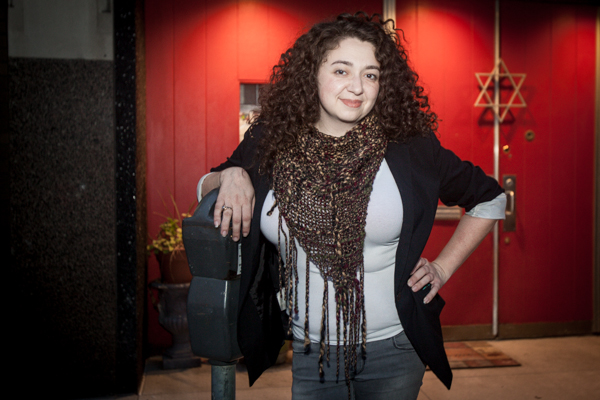
The Downtown Synagogue has done its best to respond to the needs of different elements of its community. It is this welcoming atmosphere that drew in Payne, an African American convert.
Raised as an African Methodist Episcopal, Payne grew up in Pontiac, went to school in West Bloomfield, and returned to Detroit seven years ago. After researching different religions, he felt a pull towards the Jewish faith, partly because of its doctrine of discipline and parallels with Pan-African culture. Intrigued by the Downtown Synagogue, he went out to discover more.
“I pulled the doors open,” he says. “I walked away because I was scared for some strange reason, but then I came back and I found a loving community on the other side.”
Tikkun Olam
Volunteering represents another avenue for Detroit Jews to connect with each other and the broader community. Repair the World (RTW) is a Jewish service organization whose name is a translation of the Hebrew term “tikkun olam.” In three years, the organization’s Detroit branch has brought hundreds of Jews and non-Jews together to support local youth programs, food pantries, and urban agriculture projects.
Carly Sugar, 25, recently finished a fellowship with Repair the World volunteering at Project Healthy Community Garden and continues to be involved.
Raised as a Reform Jew, she attended Temple Israel’s Hebrew School in West Bloomfield and was bat mitzvahed. She still goes to temple on High Holy Days, but religious practice hasn’t been a central focus for her. Her time at RTW encouraged her to reflect on her Jewish identity.
Sugar currently splits her time between a part-time job with Project Healthy Community and as a program coordinator at Temple Emanu-El’s Religious School where she engages students on social and environmental justice issues. Her work at Temple Emanu-El has allowed her to bridge her Detroit experiences with her Jewish suburban roots.
“We seek to address issues that are present in the suburbs, where the students live, and in Detroit as well. This act of teaching, learning, discussing, and contemplating how we connect with others and with the Earth — to me, that is a Jewish act.”
Sugar has lived in Detroit for about a year and now. While she occasionally attends events at the Downtown Synagogue, she’s just as apt to run into fellow Jews at gatherings around the city. She speaks of the city’s new Jewish population as part of the larger fabric of a city that for her is a place of great challenges, troubling inequality, and also exciting change.
“Taking part in this work in Detroit has brought me a sense of community unlike any I have experienced before,” she says.
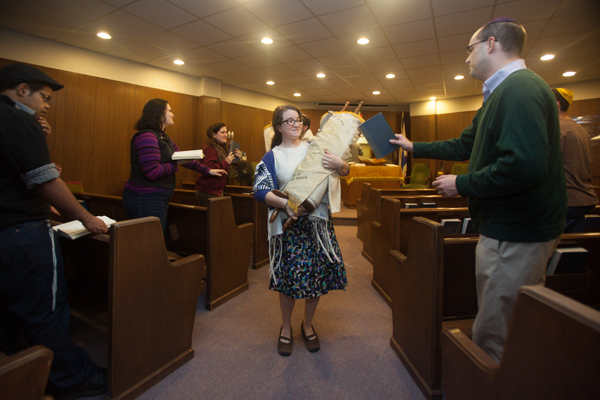
Chabad in the D
Rabbi Yisrael Pinson, 38, has been in the Chabad movement, which provides outreach to unaffiliated Jews, all his life. His parents opened a Chabad center in the 1970s in southeast France. Metro Detroit has been his home since he moved here with his wife Devorah, an Ohio native, in 2000. Prior to beginning his efforts in Detroit three years ago, he worked with the Jewish recovering community.
Now he lives with his family in Detroit, running a community center in Brush Park that opened last year with his wife. The Chabad of Greater Downtown Detroit (ChabaD) is geared towards attracting and meeting the needs of young Jewish adults that work, live, and hang out in Detroit. His organization sponsors events like a bi-weekly Shabbat dinner and the annual downtown Hannukah festival in Campus Martius. But just as importantly, ChabaD networks with groups like students, lawyers, medical workers, and other young professionals.
Pinson wants to provide a mooring for young Detroit Jews between the time they leave college and get married. He doesn’t see the established suburban Jewish community as being incredibly appealing to millennials.
“We’re trying to model ourselves after Jewish communities in places like New York, Miami, Los Angeles, and Chicago, which have strong urban environments,” Pinson says. “It’s a very unique Chabad organization. We’re not necessarily following a trend of Jewish migration as much as we are trying to create the environment where people would be comfortable moving.”
Remarkably, the downtown synagogue isn’t at odds with Pinson’s organization. In fact, members of both institutions frequently attend each other’s events. It’s a welcoming attitude that bodes well for Detroit’s burgeoning young Jewish community.
“I consider our Jewish institutions in the city to be tightly linked, whereas oftentimes in the suburbs, congregations clamor and compete for new members,” says IADS director Kohn. “ChabaD serves a purpose that we simply cannot — and I’d likely say the same thing about a Reform, Humanistic, or Yeshivite community coming to the city.”
—
David Sands is a Detroit-based freelance writer. He’s covered the news for Huffington Post Detroit as an assistant editor and worked as a staff writer for the transportation news site Mode Shift. Follow him on Twitter @dsandsdetroit.
